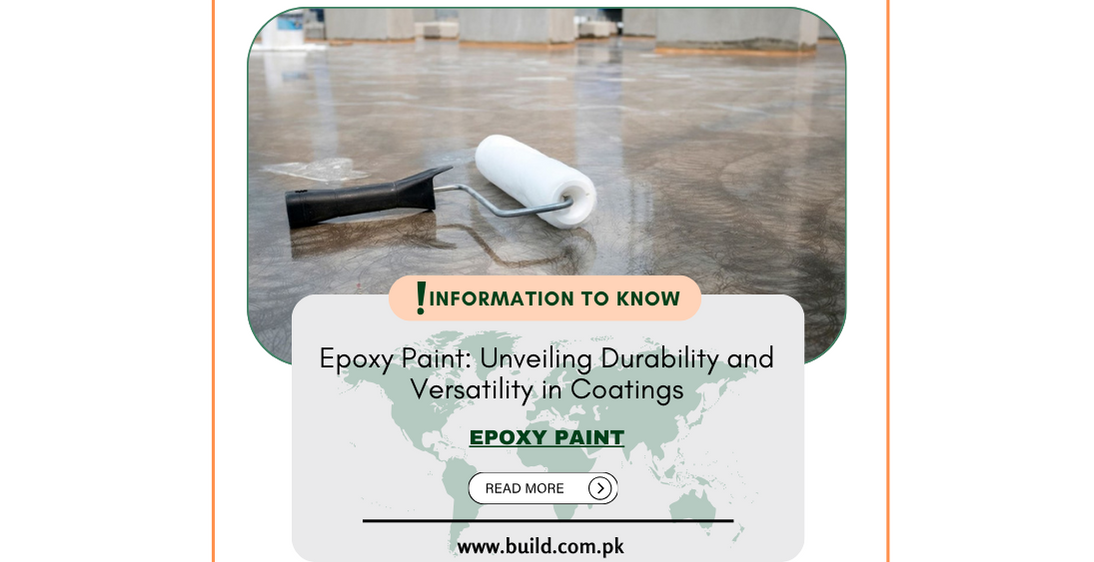Epoxy Paint: Unveiling Durability and Versatility in Coatings

Introduction:
Epoxy paint has emerged as a game-changer in
the realm of coatings, known for its exceptional durability, chemical
resistance, and aesthetic appeal. This versatile paint has found applications
in diverse industries and settings, offering a reliable solution for surfaces
that demand robust protection. In this comprehensive exploration, we delve into
the various facets of epoxy paint, uncovering its composition, applications,
advan tages, and considerations.
Understanding Epoxy Paint:
Epoxy paint is formulated by
combining epoxy resin with a curing agent, initiating a chemical reaction that
results in a tough, adherent coating. This unique composition provides epoxy
paint with outstanding adhesion, making it suitable for a wide range of surfaces,
including concrete, metal, and even certain plastics. The curing process
transforms the liquid epoxy into a durable, resilient finish that can withstand
harsh envir onmental conditions.
Applications Across Industries
Industrial Flooring:
Epoxy floor coatings have become
indispensable in industrial settings, providing a robust solution for flooring
needs. These coatings offer exceptional resistance to chemicals, abrasion, and
heavy traffic, making them ideal for factories, warehouses, and manufacturing
plants. Their seamless finish not only enhances safety but also facilitates
easy maintenance, contributing to the efficiency of industrial operations.
Automotive Sector:
In the automotive sector, epoxy paints
play a pivotal role in protecting vehicles from the harsh elements they
encounter on the road. Applied as undercoating, epoxy formulations create a
durable barrier against corrosion caused by road salts, chemicals, and
environmental factors. This application extends the lifespan of automotive
surfaces, ensuring vehicles remain in optimal condition for longer durations.
Marine Coatings:
The marine industry benefits
significantly from epoxy coatings due to their resistance to saltwater and
harsh marine conditions. Epoxy marine paints act as a protective shield for
boat surfaces, preventing corrosion and deterioration. This application not
only enhances the aesthetics of marine vessels but also contributes to their
structural integrity.
Residential Flooring:
Epoxy coatings have found their way
into residential spaces, particularly for garage floor s and basements.
Homeowners appreciate the seamless, easy-to-clean surfaces that epoxy provides.
The decorative options available in various colors and finishes allow
homeowners to customize their living spaces, combining functionality with
aesthetic appeal.
Metal Protection:
Epoxy paint serves as a reliable
protector for metal surfaces, preventing rust and corrosion. In industrial
settings, where metal structures and equipment are prevalent, epoxy coatings
contribute to the longevity and durability of these components. The strong
adhesion of epoxy ensures a lasting bond with metal substrates.
Advantages of Epoxy Paint: Description
Durability: Epoxy paint forms a resilient surface that withstands wear, impact, and exposure to harsh conditions, ensuring longevity in various applications.
Chemical Resistance: Epoxy coatings exhibit exceptional resistance to chemicals, making them suitable for environments where exposure to acids, solvents, and corrosive substances is prevalent.
Aesthetic Options: Epoxy paint comes in a wide array of colors and finishes, allowing for customization to match aesthetic preferences or specific branding requirements.
Easy to Clean: The smooth, non-porous surface created by epoxy paint makes it easy to clean and maintain, contributing to a hygienic environment.
Adhesion Strength: Epoxy's strong adhesion ensures a solid bond with various substrates, creating a cohesive and enduring coating.
Considerations Be fore Application
Surface Preparation:
The success of epoxy paint
application hinges on meticulous surface preparation. Before applying epoxy
coatings, surfaces must be thoroughly cleaned, free from dirt, grease, and
contaminants. Proper surface preparation ensures optimal adhesion and the
longevity of the coating.
Environmental Conditions:
Epoxy paint application is
sensitive to environmental conditions, including temperature and humidity. It
is crucial to adhere to recommended application conditions to facilitate proper
curing. Extreme temperatures or high humidity levels can impact the curing
process, potentially affecting the performance of the epoxy coating.
Ventilation:
Adequate ventilation during the application and curing process is essential. Epoxy paints m ay emit fumes during application, and proper ventilation ensures the dispersion of these fumes, creating a safe working environment for individuals involved in the application process.
Primer Application:
In certain scenarios, applying a primer before the epoxy paint can enhance adhesion and overall performance. The choice of primer depends on the substrate being coated and the specific requirements of the project. Selecting the appropriate primer ensures a solid bond between the substrate and the epoxy coating, contributing to the coating's effectiveness.
Conclusion:
Epoxy paint stands as a testament to the
evolution of coatings, offering a blend of durability, versatility, and aesthetic
possibilities. From industrial floors to automotive applications, its impact is
evident across diverse sectors. As with any coating solution, car eful
consideration of application conditions and surface preparation is paramount to
unlock the full potential of epoxy paint. Whether seeking a protective layer
for industrial equipment or a decorative finish for residential spaces, epoxy
paint continues to redefine standards in the world of coatings.









